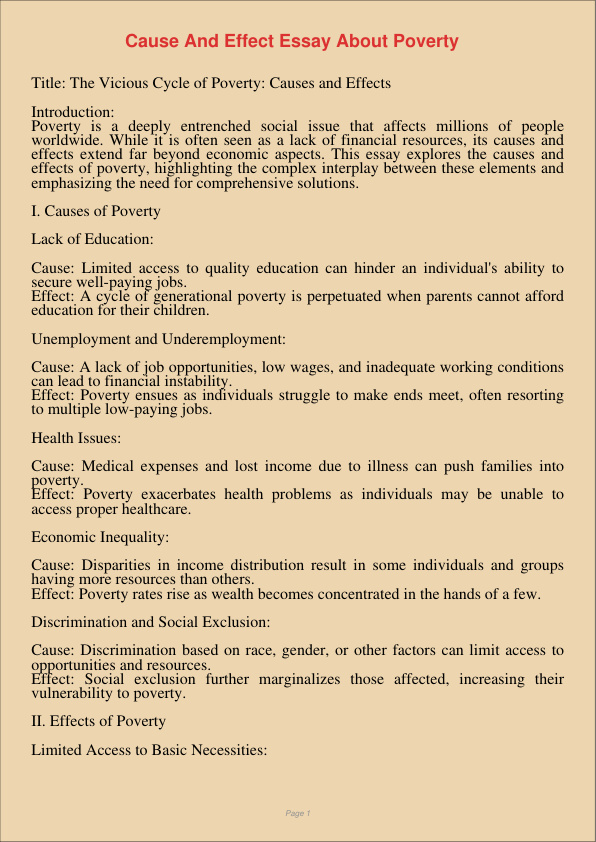Cause And Effect Essay About Poverty
Jan 9, 2024
effect essay
poverty
Philosophy
Macro & Microeconomics

Title: The Vicious Cycle of Poverty: Causes and Effects
Introduction: Poverty is a deeply entrenched social issue that affects millions of people worldwide. While it is often seen as a lack of financial resources, its causes and effects extend far beyond economic aspects. This essay explores the causes and effects of poverty, highlighting the complex interplay between these elements and emphasizing the need for comprehensive solutions.
I. Causes of Poverty
Lack of Education:
Cause: Limited access to quality education can hinder an individual’s ability to secure well-paying jobs. Effect: A cycle of generational poverty is perpetuated when parents cannot afford education for their children.
Unemployment and Underemployment:
Cause: A lack of job opportunities, low wages, and inadequate working conditions can lead to financial instability. Effect: Poverty ensues as individuals struggle to make ends meet, often resorting to multiple low-paying jobs.
Health Issues:
Cause: Medical expenses and lost income due to illness can push families into poverty. Effect: Poverty exacerbates health problems as individuals may be unable to access proper healthcare.
Economic Inequality:
Cause: Disparities in income distribution result in some individuals and groups having more resources than others. Effect: Poverty rates rise as wealth becomes concentrated in the hands of a few.
Discrimination and Social Exclusion:
Cause: Discrimination based on race, gender, or other factors can limit access to opportunities and resources. Effect: Social exclusion further marginalizes those affected, increasing their vulnerability to poverty.
II. Effects of Poverty
Limited Access to Basic Necessities:
Effect: Poverty deprives individuals of essentials such as food, clean water, and safe housing, leading to malnutrition, poor health, and substandard living conditions.
Educational Disadvantages:
Effect: Poverty can result in lower educational attainment, limiting career prospects and perpetuating the cycle of poverty for future generations.
Social Unrest:
Effect: High poverty rates can lead to social unrest, as disenfranchised individuals may resort to crime and civil disobedience as a means of survival or protest.
Mental and Emotional Stress:
Effect: Poverty often leads to chronic stress and mental health issues, affecting both individuals and families, further limiting their ability to escape poverty.
Reduced Economic Growth:
Effect: Widespread poverty hinders economic growth by limiting the productive potential of a country’s workforce and reducing consumer spending.
Cycle of Generational Poverty:
Effect: Children born into poverty are more likely to remain in poverty throughout their lives, perpetuating the cycle for future generations.
III. Breaking the Cycle of Poverty
Education and Skills Training:
Solution: Increasing access to quality education and vocational training can empower individuals to secure better job opportunities.
Economic Reforms:
Solution: Implementing policies that address income inequality, raise the minimum wage, and improve working conditions can reduce poverty.
Healthcare Access:
Solution: Ensuring affordable healthcare services and social safety nets can mitigate the financial burden of medical expenses.
Anti-Discrimination Measures:
Solution: Enforcing laws and promoting social inclusion can help create a more equitable society.
International Aid and Development:
Solution: International efforts to provide resources, infrastructure, and education in impoverished regions can alleviate poverty on a global scale.
Conclusion: Poverty is a complex and multifaceted issue with deep-rooted causes and widespread effects. Breaking the cycle of poverty requires a multifaceted approach that addresses not only the economic aspects but also the social, educational, and health-related factors that contribute to this pervasive problem. Efforts to alleviate poverty must be comprehensive, proactive, and sustainable, aimed at creating a more just and equitable world for all.